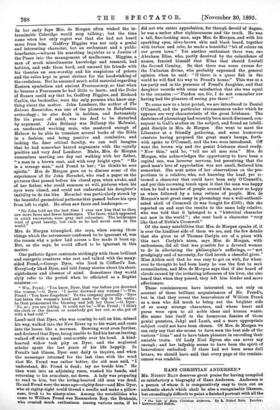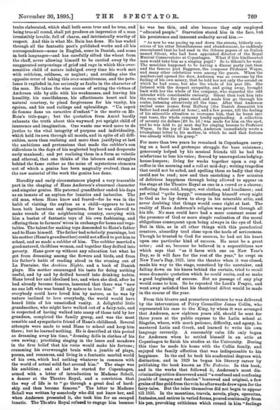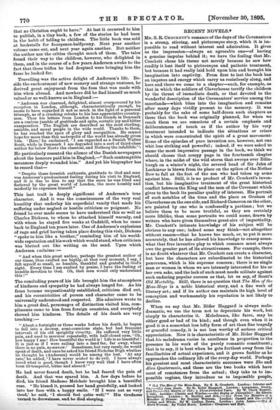HANS CHRISTIAN ANDERSEN.*
Mn. NISBET BAIN deserves great praise for having compiled• so satisfactory a biography of Hans Andersen. Andersen is a person of whom it is comparatively easy to turn out an authentic sketch which shall be also a recognisable likeness, but exceedingly difficult to paint a finished portrait with all the • The Life of Bans Christian Andersen. By a. Nisbet Bain. London: Lawrence and Batten.
traits elaborated, which shall both seem true and be true, and being true all round, shall yet produce an impression of a man irresistibly lovable, full of charm, and intrinsically worthy of respect. And this is what Mr. Bain has done. He has waded through all the fantastic poet's published works and all his correspondence—some in English, some in Danish, and some in both languages—and has carefully sifted the wheat from the chaff, never allowing himself to be carried away by the exaggerated outpourings of grief and rage in which this over- sensitive child of nature indulged every time his work met with criticism, coldness, or neglect ; and avoiding also the opposite error of taking this over-sensitiveness, and the petu- lance it exploded in, too seriously as faults in the character of the man. He takes the wise course of setting the virtues of Andersen side by side with his weaknesses, and leaving his haraility, his unselfishness, his affectionate heart and his natural courtesy, to plead forgiveness for his vanity, his egoism, and his mad railings and upbraidings. "tin esprit de femme dans un caractere d'enfant " is the motto on Mr. Bain's title-page ; but the quotation from Amiel hardly exhausts the truth about this wayward yet upright child of innocence and imagination. One wants one word more to do justice to the vital integrity of purpose and individuality, which held its own through all moods, and in spite of all diffi- culties, more than realising and more than justifying at last the ambitions and pretensions that made the cobbler's son ridiculous in the days of his neglected boyhood and desperate early manhood ; and yet realising them in a form so volatile and ethereal, that one thinks of the labours and struggles behind the fame rather as the noise of mysterious elements at of which a genii's has been magically evolved, than as the raw material of the work the genius has done.
Heredity and early circumstances played a very traceable part in the shaping of Hans Andersen's abnormal character and singular genius. His paternal grandfather ended his days as an inmate of an asylum for lunatics and imbeciles. The old man, whom Hans knew and feared—for he was in the habit of visiting the asylum as a child—appears to have been both harmless and ingenious, for he was allowed to make rounds of the neighbouring country, carrying with him a basket of fantastic toys of his own fashioning, and offering them to farmers' wives in exchange for hams and vege- tables. The talent for making toys descended to Hans's father and to Hans himself. The father had scholarly yearnings, but his mother (Hans's grandmother) could not afford to put him to school, and so made a cobbler of him. The cobbler married a good-natured, thriftless woman, and together they drifted into poverty. Hans grew up without any education but what he got from dreaming among the flowers and birds, and from his father's habit of reading aloud in the evening out of La Fontaine, the Arabian Nights, and a book of Danish plays. His mother encouraged his taste for doing nothing useful, and by and by drifted herself into drinking habits. Hans loved her and idealised her, and when she died, after he had already become famous, lamented that there was "now no one left who was bound by nature to love him." If only everybody could have loved him by nature, as he was by nature inclined to love everybody, the world would have heard little of his unsatisfied vanity. A delightful little grandmother, who might have walked out of a fairy-tale, and is suspected of having walked into many of those told by her grandson, completed the family group, and was the most sensible and sympathetic friend of Hans's childhood. Several attempts were made to send Hans to school and keep him there ; but he learned nothing. He is described at this period as dreaming away his time, "dressing dolls in clothes of his own sewing ; practising singing in the lanes and meadows in the firm belief that his voice would make his fortune; tramming his overwrought brain with a jumble of plays, poems, and romances, and living in a fantastic morbid world of his own, which had nothing whatever in common with the world of actual solid fact around him." The stage was his ambition ; and at last he started for Copenhagen, armed with a letter of introduction to Madame Schall, a dancer at the Theatre Royal, and a conviction that the way of life is to "go through a great deal of hard- ship and then become famous." The letter to Madame Schall was written by somebody who did not know her, and when Andersen presented it, she took him for an escaped lunatic. The Th(atra Royal refused to engage him because he was too thin, and also because they only employed "educated people." Starvation stared him in the face, but his persistence and innocent audacity saved him :— " As now he was pacing up and down the streets, bitterly con- scious of his utter friendlessness and abandonment, he suddenly remembered that he had read in the Odense papers of an Italian named Siboni, who had been appointed director of the Royal Musical Conservatoire at Copenhagen." What if this kindhearted man would take him as a singing pupil ? So to Siboni's he went. The musician happened to be having a dinner party just then and the famous poet Baggesen, the composer Professor Weyse, and many other celebrities were among the guests. When the maidservant opened the door, Andersen was so overcome by the feeling of his own misery, that he told her not only the errand on which he had come, but also the whole of his past life. She listened with the deepest sympathy, and going away, brought back with her the whole of the company, who regarded the odd intruder with considerable curiosity. Siboni then took him into the room where the piano stood, and made him go through his scales, listening attentively all the time. After that Andersen recited some scenes from Holberg [the Danish dramatist his father had read aloud at home], and a few poems, till the feeling of his miserable situation so overcame him, that he burst into real tears, the whole company loudly applauding. A collection of seventy rix dollars [£8 3s. 4c1.] was made for him on the snot, and he was told to go next day for singing lessons to Professor Weyse. In the joy of his heart, Andersen immediately wrote a triumphant letter to his mother, in which be said that fortune was already within his grasp."
For more than two years he remained in Copenhagen carry- ing on a hard and grotesque struggle for bare existence ; generously helped by his musical friends till he had the misfortune to lose his voice; fleeced by unscrupulous lodging- house-keepers; living for weeks together upon a cup of coffee in the morning and a roll at mid-day ; writing tragedies that could not be acted, and spelling them so badly that they could not be read ; now and then snatching a few minutes of delirious happiness through being allowed to appear on the stage at the Theatre Royal as one in a crowd or a chorus; suffering from cold, hunger, wet clothes, and loneliness ; and yet withal "quite happy," commending himself every night to God as he lay down to sleep in his miserable attic, and never doubting that things would come right at last. The reality of Hans Andersen's religion was proved through all his life. No man could have had a more constant sense of the presence of God or more simple realisation of the moral obligations consequent upon being always in the eye of God. But in this, as in all other things with this paradoxical creature, absurdity trod close upon the heels of seriousness.
Though he trusted to God for success, be had set his heart upon one particular kind of success. He must be a great actor ; and so, because he believed in a superstitious saw which says that "as it fares with one on New Year's Day, so it will fare for the rest of the year," he crept on New Year's Day, 1821, into the theatre when it was closed, made his way to the stage, unnoticed by the caretaker, and falling down on his knees behind the curtain, tried to recall some dramatic quotation which he could recite, and so make a good beginning of success. But no passage of any play would come to him. So he repeated the Lord's Prayer, and went away satisfied that his theatrical debut would be made in the course of the year.
From this bizarre and precarious existence he was delivered by the intervention of Privy Councillor Jonas Coffin, who represented his case to the King, by whom it was arranged that Andersen, now eighteen years old, should be sent for three years at the public expense to the Latin school at Slagelse, where, with much patience, difficulty, and agony, he mastered Latin and Greek, and learned to write his own language correctly. A reasonably calm life only began for Andersen when he settled himself in an attic at Copenhagen to finish his studies at the University. During this time he made his home with the Collin family, and enjoyed the family affection that was indispensable to his happiness. In the end he took his academical degrees with distinction, and in 1829 he began his literary career by publishing the book known as The Fodreise. In this book, and in the works that followed it, Andersen's most dis-
criminating critics discovered amid "a confused and confusing jumble of images and fancies" borrowed and original, a few grains of fine gold from the vein he afterwarda drew upon for the fairy-tales. But the tales themselves did not begin to appear till 1835. In the meantime, travels, novels, plays, operettas, fantasies, and satires in varied forms, poured continually from his pen, provoking criticisms which roused in him "feelings
that no Christian ought to have." At last it occurred to him to publish, in a tiny book, a few of the stories he had been in the habit of telling to children. The little book was sold at bookstalls for fourpence-halfpenny. Next year another volume came out, and next year again another. But neither the author nor the critics thought much of them. The tales found their way to the children, however, who delighted in them, and in the course of a few years Andersen awoke to the fact that these trifles he had despised were bringing him the fame he looked for.
Travelling was the active delight of Andersen's life. Be- side the enchantment of new scenery and strange customs, he derived great enjoyment from the fuss that was made with him when abroad. And nowhere did he find himself so much valued or so well-known as in England :—
" Andersen was charmed, delighted, almost overpowered by his reception in London, although, characteristically enough, he seems to have regarded it not so much in the light of a personal triumph, as of a crushing rebuke to his less appreciative country- men. Thus his letters from London to his friends in Denmark are a curious jumble of gratitude and spite, ecstatic joy and bitter exasperation. The English are described as the most sterling, amiable, and moral people in the wide world. Thanks to them, he has reached the apex of glory and recognition. He cannot hope for more than this metropolis of the world has already given him. `Here,' he exclaimed, 'I am regarded as a Danish Walter Scott, while in Denmark I am degraded into a sort of third-class author fax below Hertz the classical, and Heiberg the infallible.",
He particularly resented the silence of the Danish newspapers about the honours paid him in England,—" Such contemptible meanness deeply wounded him." And yet his biographer has to record that-
" Despite these feverish outbursts, gratitude to God and man was Andersen's predominant feeling during his visit to England, and it is due to him to say that the more he was feted and flattered by the great world of London, the more humbly and modestly he expresses himself."
This last trait is deeply significant of Andersen's true character. And it was the consciousness of the very real humility that underlay his superficial vanity that made his suffering under neglect or hostile criticism so poignant. No friend he ever made seems to have understood this so well as Charles Dickens, to whom he attached himself warmly, and with whom he stayed five weeks at Gadshill, when he came back to England ten years later. One of Andersen's explosions of rage and grief having taken place during this visit, Dickens "spoke to him like a brother," reminding him of his world- wide reputation and his work which would stand, when criticism was blotted out like writing on the sand. Upon which Andersen exclaims :—
"And when this great author, perhaps the greatest author of our times, thus exalted me highly, at that very moment, I say, I felt myself so small, so humble, thankful and grateful in God's sight. Every time I am exalted by praise, I have the feeling of humble devotion to God. Oh, that men would only understand this !"
The concluding years of his life brought him the atmosphere of kindness and sympathy he had always longed for. As his fame became unquestionably established, criticism died out, and his eccentricities of person and character came to be universally understood and respected. His admirers wrote to him a great deal, personages of distinction visited him, com- pliments came to him from foreign countries, and everybody showed him kindness. The details of his death are very touching :—
" About a fortnight or three weeks before his death, he began to fall into a drowsy, semi-conscious state, but had frequent intervals of his old sprightly vivacity. He suffered very little pain, and used to murmur repeatedly, with half-closed eyes, Oh, how happy I am ! How beautiful the world is ! Life is so beautiful ! It is just as if I were sailing into a land far, far away, where there is no pain, no sorrow.' Sometimes, but very rarely, he would speak of death, and once he asked his friend Nicholas Thigh whether he thought he (Andersen) would be among the lost. At any rate,' he added, I have never wished to do evil. I have always loved what is good, though I know very well that I have often been ill-tempered, bitter and absurd."
He had never feared death, but he had feared the pain of death. And that was spared him. A few days before he died, his friend Madame Melchoir brought him a beautiful rose. "He kissed it, pressed her hand gratefully, and looked into her face with a happy smile. 'If I were not so very tired,' he said, should feel quite well." His tiredness turned to drowsiness, and he died sleeping.












































 Previous page
Previous page